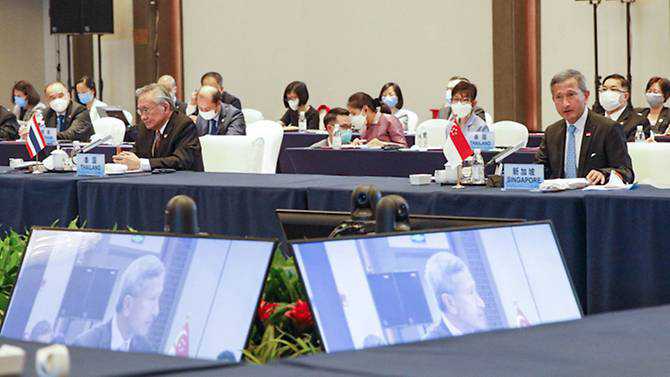'Very slow' progress in resolving Myanmar crisis is 'disappointing': Vivian Balakrishnan
08 June, 2021

The “very slow” progress being made to resolve the ongoing crisis in Myanmar is disappointing, said Singapore’s Foreign Affairs Minister Vivian Balakrishnan on Mon (Jun 7).
The problem in Myanmar was among the problems discussed at Particular ASEAN-China Foreign Ministers’ Assembly in Chongqing, China.
“All of us were united on the necessity for an instantaneous cessation of violence, on the necessity for the launching of detainees and for meaningful negotiations and dialogue to occur among all parties," Dr Balakrishnan told Singapore reporters above a contact from Chongqing.
“And even the appointment of an ASEAN envoy only is practical if there is an authentic desire within Myanmar itself for genuine dialogue and negotiations and reconciliation. Which means this continues to be a work happening,” he added.
“To be honest with you, we are disappointed at the slower - very, very slower progress. Unfortunately, we know that we now have still civilians who've been harm or killed. There has been no let go of political detainees, there's been no real sign of meaningful political dialogue and negotiation. Consequently we’ll have to watch this space.”
Dr Balakrishnan reiterated that ASEAN’s main role isn't to interfere, as “ultimately, only the people themselves within Myanmar can determine its future”.
“But ASEAN stands ready to support, to be supportive, to facilitate mediation if possible, but we must wait. It’s disappointing but let’s not quit hope,” he said.
SOUTH CHINA Ocean CODE OF CONDUCT
The high-level meeting in Chongqing marks the 30th anniversary of ASEAN-China relations.
In addition, it comes amid latest tensions found in the South China Sea. On May 31, Chinese warplanes entered Malaysia's maritime area atmosphere space and flew within 60 nautical miles of Sarawak - a move that Malaysia named a “breach of (its) airspace and sovereignty”.
Dr Balakrishnan said the problem found in the South China Ocean is an exemplory case of the challenges found in ties between China and ASEAN.
He added that officials have already been “working in the last few years" on trying to create progress on the Code of Conduct for the South China Ocean.
It was designed to be finalised by the finish of the entire year, but talks have already been stalled because the COVID-19 pandemic hit last year.
“This morning the officials met … And all of this again is preparatory work for what I wish will be progress in the a long time to a substantive Code of Conduct, which will improve stability, security,peace and opportunity for prosperity across Southeast Asia, and in the South China Sea between us and China," he said.
“NOT THE PROPER TIME" TO RESTART TRAVEL
Dr Balakrishnan also acknowledged the “effective cooperation” between China and ASEAN because the pandemic occur - noting China's provision of vaccines and medical items to the region.
Beyond this, he said that Singapore and China are looking at how they are able to restart travelling safely, assuming the COVID-19 situation remains in order.
Dr Balakrishnan had said in April that Singapore welcomed China’s proposal on the mutual recognition of well being certificates, calling it a good "timely initiative" as both countries have begun vaccination programmes.
On Mon, he said there were discussions on bilateral acknowledgement of vaccine certificates and both sides are sorting out the details of protocols for travel.
“Consequently yes, the discussions are ongoing, it’s great. But like I said, this is not the right time to press the beginning button yet,” he said.
He added, however, that whenever the situation increases both found in Singapore and found in China, the two countries will be ready.
THE AREAS OF DISCUSSION
Dr Balakrishnan noted that days gone by three years of diplomatic ties have been “momentous” with China and ASEAN’s economic development.
The meetings are thus a chance to “think about successes” but also to go over ways to progress on challenges confronting China and ASEAN, he said.
Another “fertile” area of discussion, he said, was financial recovery and opportunities for investment - particularly relating tothe Belt and Highway Initiative.
Sustainable development was also over the agenda - a location that will provide “ample opportunities for collaboration in the future”, he said.
Source:
